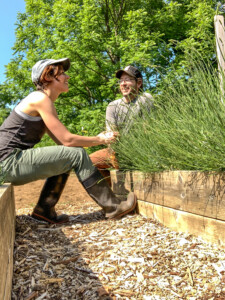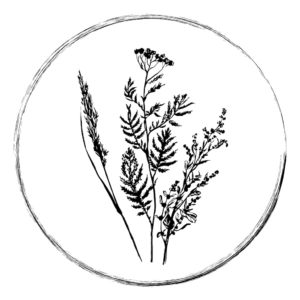Artemisia Farm & Vineyard

Andrew Napier & Kelly Allen
About
Owners & winemakers: Andrew Napier and Kelly Allen
Vineyards: 2 acres of newly-planted vines. They’re starting with locally-purchased fruit and working towards 100% estate-grown fruit as their young vines come into production.
Vineyard management: Sustainable with organic practices
Soils: Mostly Tankerville-Purcellville complex, with some silty clay loam
Grapes grown: Cayuga, Louise Swenson, Prairie Star, Marquette, Frontenac Blanc, Frontenac Gris, Sabrevois, miscellaneous Amber’s Hybrids, Carlos Muscadine
Annual production: 1,800 bottles
Quick facts:
- Artemisia’s “botanical wines” combine hybrid grapes and locally-grown, primarily native herbs and spices to create a distinctively Mid-Atlantic take on aromatized wine.
- Their sustainable farm produces vegetables for their CSA as well as most of the botanicals in their wines, plus they recently planted two acres of hybrid grapes.
- “Our wines move beyond just grapes to include the full scope of crops and botanicals native to the Mid-Atlantic. They are the culmination of our respective journeys in realizing the expressive cultural power embedded in wine.” – Kelly Allen & Andrew Napier
Artemisia Farm and Vineyard is a project that’s redefining what it means to make truly local wines in Virginia. Andrew Napier and Kelly Allen established the farm in 2019 after careers taking them both through all aspects of the wine industry. Today, they are farmers first and foremost, growing vegetables for their CSA as well as grapes and various herbs and botanicals for their wines.
At Artemisia, they exclusively make aromatized wines, which they call “Botanical Wine.” “We came to the prospect of winemaking as a continuation of our cocktail bitters,” Kelly explains. “We both felt that wine had the unique potential to express the agricultural narrative in a way that other food and drink did not. As farmers, we know full well the impact of terroir on everything we grow, from grapes to tomatoes. We wanted to breach the wall of terroir, so to speak, by including other ways of expressing its manifestation. The experiential play of bar craft and the creative liberty of aromatized wine fit the bill nicely. ”
They work out of “what can charitably be called an oversized garage,” as Kelly puts it. The base wines are crafted from hybrid or local grapes, sometimes incorporating other “local fermentables” such as plums or sweet potatoes. While they’re currently purchasing sustainably grown fruit from nearby growers, they’ve planted two acres of hybrid grapes including Cayuga, Marquette, and Frontenac alongside other even less well-known varieties. Kelly and Andrew are passionate about the potential of these grapes, which are more naturally resistant to the challenging Virginia climate. “For most of our winemaking history, hybrid and native grapes were vilified due to their sparse resemblance to the Vitis vinifera flavor profile,” Kelly explains. “This exclusive and classist norm is finally fading as consumers and producers alike learn the value of climatically-appropriate grape varieties.” Focusing on these grapes allows them to reduce chemical inputs to the absolute minimum. Once their vineyards have reached full production, they intend to work with exclusively estate-grown fruit.
Each wine is infused with a unique blend of botanicals, then fortified with brandy. The botanicals include plants and herbs that are either native or acclimatized to the region, many of which they grow themselves on the farm. “Our philosophy in the winery is one of minimalistic creativity, Kelly tells us. “We aim to leave as much of the wine intact as possible, while allowing for a wide berth in the variety of botanicals we use. The result is something both deeply authentic and infinitely unpredictable. Like nature itself, we take many paths along a single road.”
“When people taste our wine, they often tell us that they’ve never tasted anything like it. That’s truer than they might realize. Our wines are distinctly defined by the flora of our place. While many have made vermouth in the Mid-Atlantic, none to our knowledge have gone so far as to craft entirely new expressions of bioregional terroir. These are irreplaceable wines. They change with the season not only in the vineyard, but in the very makeup of the plants we use to build them. Each vintage is unique unto itself.”

